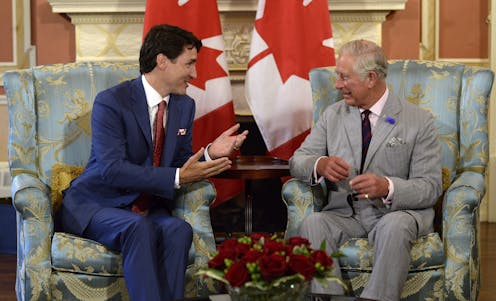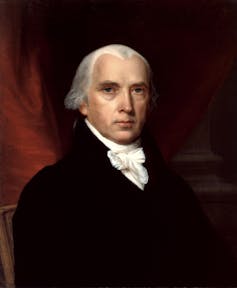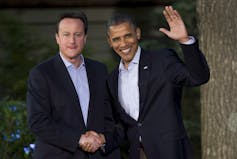
Questions are being raised again about how the Canadian government makes decisions to use force or participate in armed conflicts, prompted by reports that special forces units of the Canadian Armed Forces were operating on the ground in Ukraine.
While ostensibly deployed strictly for “training purposes,” such involvement can lead to more direct engagement in an armed conflict.

The decision to engage in armed conflict is one of the most consequential decisions a government can make. Who is involved in the decision-making, and what conditions or principles govern that process? Even more importantly, how should these decisions be made?
As a recent report suggests, the Ukrainian deployment has rekindled interest in these questions on Parliament Hill. But there should be a broader public discussion and debate.
Most Canadians would be surprised to learn that the prime minister and the cabinet have a far more unfettered power under the so-called royal prerogative to take the country to war than most other western democracies.
Early limits on war-waging powers
The modern idea that the power of the executive branch to wage war should be limited can be traced back at least as far as the Glorious Revolution in 1688, when English parliament placed constraints on the king’s ability to raise and maintain an army.

American founding father James Madison and German philosopher Immanuel Kant, among others, further developed these ideas in the 18th century, arguing that legislatures should be involved in any decision to engage in war.
In their view, not only were legislatures most representative of the people who would have to pay and die for the war, but they were less prone to self-aggrandizing adventures or capture by special interests than the executive branch. The U.S. Constitution reflects Madison’s ideas, requiring Congress to approve declarations of war.
More recent research on deliberative and representative democracy has found that spreading decision-making across both the executive and legislative branches, and forcing the executive to explain and defend its reasons in order to win legislative approval, make for decisions that are objectively better for the national interest than those made by the executive alone.
The process results in deeper deliberation and a wider range of perspectives, greater transparency and less opportunity for the excessive influence of narrow interests. What’s more, such a process leads to policy that is viewed as more legitimate and representative — and therefore more likely to win public understanding and support.
Speed, secrecy
Supporters of unilateral executive authority to wage war argue that involving the legislature makes the decision-making process too cumbersome, and that public debate would require disclosing classified information.
Such a process could make countries seem unreliable in the eyes of allies, they add. Speed and secrecy are of the essence, so the argument goes.
But short of responding to a direct attack — for which exceptions exist in all systems — deciding to engage in armed conflict shouldn’t be easy.
Governments should be required to persuade citizens that force is necessary. The more obvious it is that force is in the national interest, the easier it will be to obtain approval; the more difficult it is to get approval, the more it suggests that the reasons are not compelling.
As for secrecy, it’s difficult to imagine what secrets would have to be disclosed in arguments about whether to go to war.
Differing war powers
The constitutional systems of most liberal democracies include constraints on which branches of government can be involved in decisions to wage war, and how such decisions are to be made.
Countries that include the United States, France, Italy, the Netherlands, Spain, Brazil and India explicitly require that decisions to initiate war are approved by the legislature.
Some constitutional systems — Germany’s, Italy’s and Japan’s, for example — include constraints on how and when the government may go to war, incorporating the international law prohibition on the use of force. Still others, including some Nordic countries, include both kinds of constitutional constraint.
To be sure, these constitutional war powers, both those requiring legislative involvement and those imposing conditions on when force may be used, are contested in several of these countries, with debates over their interpretation and scope. But they do operate in ways that constrain and shape government action.

For instance, both Barack Obama in the U.S. and David Cameron in the U.K. felt compelled when leading their countries to ask for legislative approval for strikes on Syrian chemical weapons facilities in 2013. The failure to obtain such approval caused both governments to seek diplomatic alternatives.
Canada’s royal prerogative
Canada, in contrast, has no such constitutional constraints. The U.K. and its former dominions (Canada, Australia and New Zealand) are the outliers in this regard. The decision to go to war remains within an exclusive executive power known as the royal or Crown prerogative, giving the executive branch largely unfettered power to decide whether to wage war.
As British prime minister, Anthony Eden, for instance, decided with only an inner circle of cabinet members to conspire with the governments of France and Israel to invade Egypt to regain control of the Suez Canal in 1956, with no notice to parliament or even all of his cabinet. The resulting conflict was a disaster for the U.K., accelerating its decline from great power status.

Yet even the U.K. and Australia have had meaningful debate over war powers and the royal prerogative following their involvement in the Iraq invasion in 2003.
In both countries, there were efforts to enact legislation requiring parliamentary approval of decisions to engage in armed conflict. While neither country has yet enacted such laws, the debate was broad and meaningful. In the U.K., it led to the establishment of a new constitutional convention that requires government to obtain parliamentary approval before using force. This was evident in Cameron’s effort to obtain approval in 2013.
Deeper debate needed
Canada, having avoided the Iraq war, did not experience similar soul-searching and remains the extreme outlier.
Academic discussion of the issue tends to reflect general support for the royal prerogative.
But democratic and constitutional theory, together with practice in other liberal democracies, suggest that Canada needs to engage in a deeper debate of these issues. It’s odd that the federal government must involve Parliament to establish a new tax but can drag the country to war without so much as a formal debate.
A more representative and accountable decision-making process is called for in Canada.
Craig Martin is affiliated with The Rideau Institute on International Affairs, a not-for-profit that focuses on foreign and defence policy.
This article was originally published on The Conversation. Read the original article.







